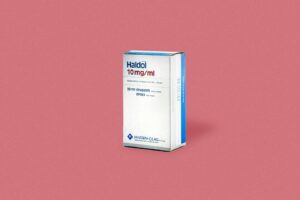From Slate: “[The molecule that would become Haldol] had a curious effect. It didn’t seem to work as a painkiller. This [Belgian pharmacologist Paul] Janssen could tell by measuring the pupils of his rodents when they were placed on a hot metal plate. But while the animals did register pain, they seemed paradoxically unconcerned about it. The chemical put them in a trancelike state, apparently unmotivated to lift their paws. Second after second went by—30 seconds or more ticked past—and the mice stayed where they were on the scorching surface.
The chemical intrigued the pharmacologist. He gave it to Belgian psychiatrists for trial-and-error experiments. It was injected into two alcoholics going through the hallucinations of delirium tremens and then into 18 psych ward patients. ‘We consider its hallucinolytic action’—its reduction of voices and visions—’to be greater than that of any other neuroleptic,’ the psychiatrists wrote, referring to Thorazine and other ‘antipsychotics.’ But they noted that with the new chemical, ‘Parkinsonism is the norm.’ Next, a French psychiatrist who had earlier developed Thorazine tested the new drug. He affirmed its effect on hallucinations but warned about frequent damage to the brain and nervous system. In a French journal, he urged that dosages be kept moderate to lessen the side-effects: a skewed gait, facial rigidity, drooling, torpor, and a range of often irreversible tics, from shoulder-rocking to tongue-thrusting.
If it was used judiciously, psychiatrists now had, it appeared, a better molecule to pit against psychosis. Gradually, though, it was not only the drug’s safety but its efficacy that was questioned. Much later, The Lancet, Britain’s premier medical journal, published an analysis spanning backward over more than half a century’s worth of studies assessing ‘antipsychotics’: Haldol didn’t do impressively well—even when its devastating side-effects were left out and the calculation included only addressing psychotic symptoms. And in America, a careful concern for Haldol’s side effects never did prevail . . . Typical Haldol doses doubled between the mid-’70s and mid-’80s, climbing to levels many times higher than in Europe.
The reasons for this aren’t easy to pin down. Johnson & Johnson denied the dangers, and professional organizations did their part. Right after speaking on Oprah about the risks posed by Haldol, one psychiatrist found himself under investigation, fending off an attempt to revoke his medical license. And psychiatrists likely managed to deceive themselves. A potent medicine is a seductive thing to possess and prescribe. But corporate self-interest and practitioner self-deception aren’t limited to America; they are insufficient explanations for American dosages. Perhaps, then, American culture is especially prone to a faith in cures and a belief that aggressive methods will prove to be remedies, even panaceas.
By the ’90s, Haldol was supplanted by a new generation of ‘antipsychotics,’ though it remains a drug of choice in emergency rooms . . . Studies have found the new generation of drugs to be only somewhat better than their predecessors, or no better at all. They are helpful for some, with severe side effects for many. There have been no great medical solutions, not for psychosis, not for our more common conditions like depression and anxiety.
Neuroscientist after neuroscientist told me that we have made little to no true progress in medicating our psyches for more than half a century.”

***
Back to Around the Web











